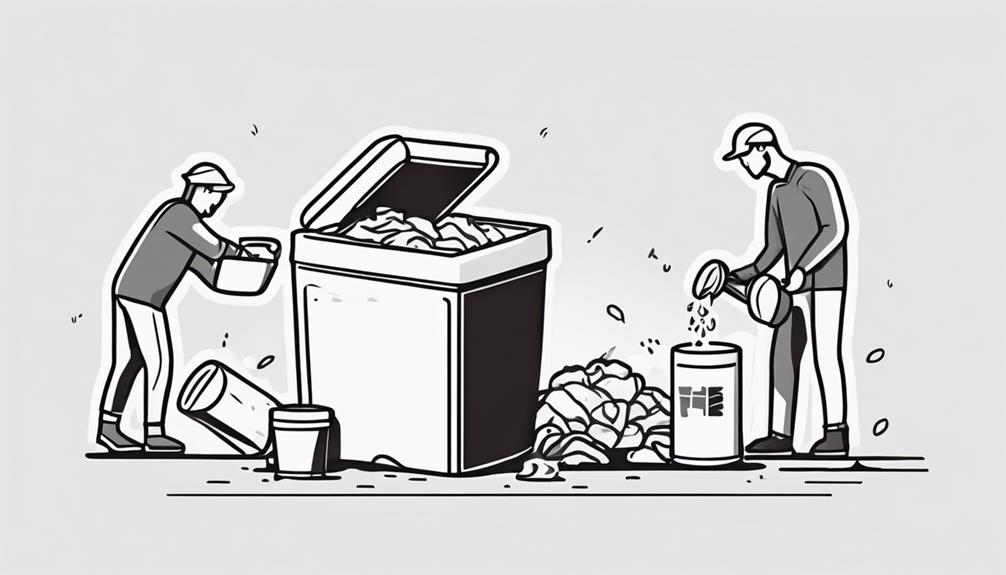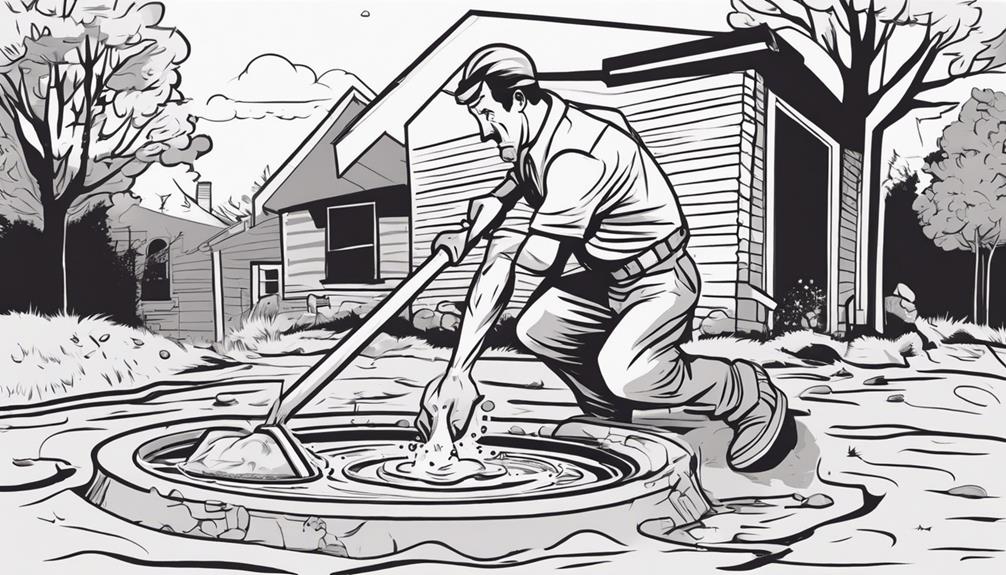Maintaining your septic tank may seem daunting, but neglecting it can lead to costly repairs. By following five essential DIY maintenance tips, you can ensure your system runs smoothly and efficiently.
From understanding how your septic system functions to handling unexpected emergencies, these practices will help you avoid potential disasters. Whether you're a new homeowner or seasoned pro, staying on top of your septic tank maintenance is crucial for a healthy home environment.
Key Takeaways
- Regularly inspect and pump your septic tank every 3-5 years.
- Avoid flushing non-biodegradable items and chemicals to maintain system health.
- Monitor soil saturation and prevent excessive water diversion to protect the drain field.
- Immediate professional assistance is crucial for handling septic tank emergencies effectively.
Understanding Your Septic System

To properly maintain your septic system, it's essential to understand how it functions and the key components involved. The anatomy of a septic system consists of a few main parts: the pipe from your house, the septic tank, and the drain field. Waste from your home flows through the pipe into the septic tank, where solids settle at the bottom and bacteria break down organic matter. The clarified liquid then moves to the drain field where it's naturally filtered through the soil.
Understanding this system is crucial for establishing a maintenance schedule. Regular maintenance ensures the system works efficiently and prevents costly issues. A typical maintenance schedule includes pumping the septic tank every 3 to 5 years, depending on usage. This prevents solids from building up and clogging the system. Additionally, being mindful of what goes down your drains, such as avoiding harsh chemicals and excessive grease, can help maintain a healthy septic system. Understanding the anatomy and adhering to a maintenance schedule will keep your septic system running smoothly for years to come.
Regular Inspections and Pumping
Regularly inspecting and pumping your septic tank is crucial for maintaining its optimal functionality and preventing potential issues. Establishing an inspection schedule is key to ensuring that your septic system is operating efficiently. It's generally recommended to have a professional inspect your septic tank at least once every three years. However, if your household has a garbage disposal or experiences heavy water usage, more frequent inspections may be necessary. During these inspections, the professional will check for any signs of leaks, blockages, or other issues that could lead to costly repairs if left unaddressed.
Pumping frequency is another essential aspect of septic tank maintenance. The frequency at which you should pump your septic tank depends on factors such as the tank's size, the number of occupants in your household, and your water usage habits. On average, septic tanks should be pumped every 3 to 5 years. However, if you notice any signs of a full tank, such as slow drains or foul odors, it's crucial to schedule a pump-out promptly to prevent backups and system malfunctions. Regular inspections and adhering to a proper pumping schedule are vital for the longevity and effectiveness of your septic tank.
Proper Waste Disposal Practices

Maintain proper waste disposal practices to ensure the efficient operation of your septic tank and prevent potential issues. To promote eco-friendly disposal and prevent backups, it's crucial to be mindful of what goes down your drains. Avoid flushing non-biodegradable items such as paper towels, wipes, feminine hygiene products, and chemicals. These items can clog the septic system and lead to costly repairs. Opt for biodegradable soaps and detergents to minimize the impact on your septic tank and the environment.
Additionally, be cautious of what you dispose of in your kitchen sink. Grease, oils, and fats should never be poured down the drain as they can solidify and cause blockages in the pipes. Instead, collect these substances in a container and dispose of them in the trash once solidified. By adopting these simple waste disposal practices, you can maintain the health of your septic system, prevent backups, and contribute to a more sustainable environment.
Maintaining Drain Field Health
Ensuring the proper function and longevity of your septic system requires vigilant care and attention to the health of your drain field. Soil saturation is a crucial factor to monitor, as excessive water can lead to drainage issues and potential system failure. To prevent soil saturation, avoid diverting large amounts of water, such as from sump pumps or excessive household water usage, towards the drain field. Regularly inspecting for any signs of standing water or overly damp soil can help catch potential saturation problems early.
Another essential aspect of maintaining drain field health is preventing root intrusion. Tree roots are naturally drawn to the moisture and nutrients present in the drain field, posing a risk of clogging or damaging the system. To mitigate this risk, plant trees and shrubs a safe distance away from the drain field and consider barrier systems if planting closer. Regularly check for any signs of root intrusion and address them promptly to avoid costly repairs and system malfunctions. By staying proactive and attentive to soil saturation and root intrusion, you can help ensure the optimal performance and longevity of your septic system.
Handling Septic Tank Emergencies

In the event of a septic tank emergency, immediate action is crucial to prevent further damage and ensure the safety of your system. When faced with such a situation, quick thinking and appropriate measures can make a significant difference in mitigating the issue.
Here are some essential tips for handling septic tank emergencies:
- Emergency Response: Contact a professional septic tank repair service promptly to assess the situation and provide expert guidance on the next steps.
- Avoid Water Usage: Minimize water usage in your household to prevent overloading the system until the emergency is resolved.
- Stay Clear: Keep away from the affected area to avoid any health hazards or additional damage.
- Document the Incident: Take notes and pictures of the emergency for insurance purposes and future reference.
- Follow Professional Advice: Adhere to the recommendations provided by the septic tank repair experts to facilitate a swift and effective resolution of the issue.
Frequently Asked Questions
Can I Use a Septic Tank Additive to Help Maintain My System?
You can use a septic tank additive to help maintain your system, but effectiveness varies. When considering DIY septic tank maintenance, research tips and tricks to ensure proper care. Regular pumping and monitoring are essential.
How Often Should I Have My Septic Tank Inspected for Leaks or Damage?
You should have your septic tank inspected for leaks or damage every three to five years. Signs of damage include foul odors, slow drainage, and pooling water. Regular inspections ensure early detection and prevent costly repairs.
Are There Any Specific Household Products I Should Avoid Using to Prevent Damage to My Septic System?
Avoid using common misconceptions such as bleach, antibacterial soaps, and harsh chemicals as they can harm your septic system and have a negative environmental impact. Stick to septic-safe products to maintain system health.
What Are Some Signs That Indicate My Drain Field May Be Failing?
If your drain field is failing, signs like soggy ground, sewage odors, or slow drainage can indicate trouble. To prevent extensive damage, consider drain field restoration promptly to avoid costly repairs.
Is It Safe to Plant Trees or Shrubs Near My Septic System?
When planting near your septic system, remember roots can damage tanks. Follow landscaping restrictions, keep trees and shrubs at a safe distance. Prevent root intrusion to maintain septic health for worry-free gardening.
Conclusion
Remember, proper DIY septic tank maintenance is crucial for the health and longevity of your system. By understanding how your septic system works, regularly inspecting and pumping it, disposing of waste correctly, maintaining your drain field, and knowing how to handle emergencies, you can ensure your septic tank stays in top shape.
Follow these essential tips to keep your septic system safe and sound.

